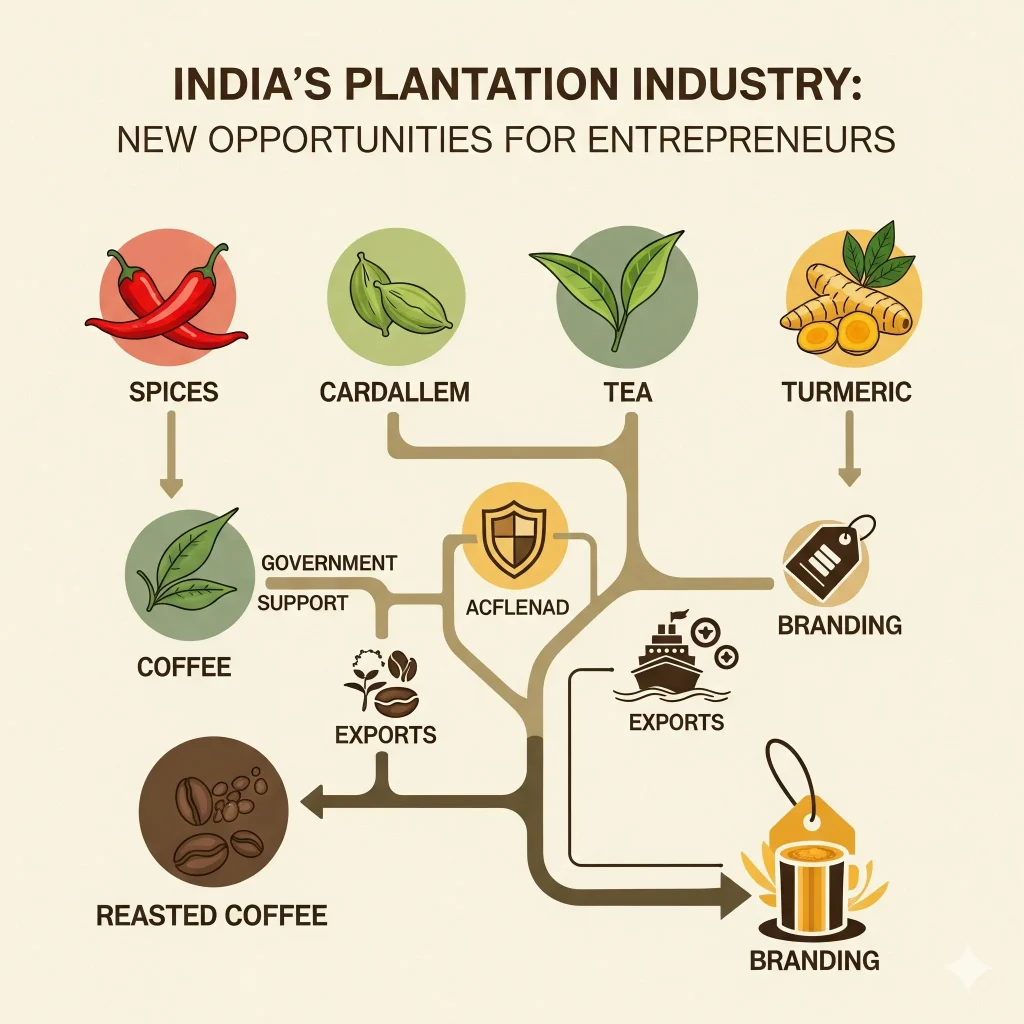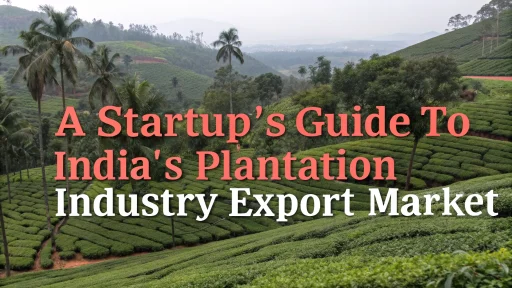The New Wave of Plantation Entrepreneurship
India’s plantation industry has been the backbone of its agribusiness, from Darjeeling Tea to Malabar Pepper and Kerala Rubber to Araku Coffee. But in 2025, the narrative is changing–plantations are no longer just about farming and exports; they’re about innovation, branding, and global business building.
Press Information Bureau release (PRID 2159806 dated August 22, 2025) highlighted how Union Minister Shri PiyushGoyal instructed Plantation Boards on focusing on export diversification and Brand India promotion. It also mentioned skilling and incubation of startups. This is more than just a policy for entrepreneurs. It’s also a roadmap towards wealth creation.
We at Niir Project Consultancy Services see this as a unique opportunity for startups to create globally competitive, sustainable businesses. We have a unique perspective on these opportunities as we prepare Market Survey cum Detailed Techno-Economic Feasibility Reports. This article is intended to translate government policies into practical guidance for entrepreneurs and investors.
For brief knowledge check out our Books, Spices and Condiments Cultivation, Processing and Extraction with Formulation, Ground and Processed Spices, Grinding of Whole Spices, Indian Kitchen Spices Product Mix, Kitchen Masala Powder Manufacturing
The Government’s Blueprint on Plantation Growth
The PIB releases a playbook of strategic plantation management. Highlights include:
- Export Diversification Through FTAs
India uses Free Trade Agreements to expand its market reach in the EU and UK, the Middle East, and ASEAN. Startups are now able to bypass the traditional limitations of targeting niche markets such as organic turmeric in Europe or spice blends for the Middle East. - Brand India and GI Integration
The government has ordered that all Plantation Boards use the word “India” as part of their logos, and to promote GI-tagged goods. Darjeeling Tea and Araku Coffee, as well as Malabar Pepper, will have a global impact, but they also help private startups to gain recognition. - Bharat Pavilion to Global Showcases
The Bharat pavilion at international fairs allows small businesses to get visibility without having to pay for solo participation. This allows startups to enter global expos with low barriers. - Support for Incubation and Skill Development
The Ministry of Skill Development and Entrepreneurship is collaborating with growers and startups to ensure that they receive the training necessary. A common incubation centre, inspired by the Atal Innovation Mission, could give rise to unicorns in plantation-focused food processing, packaging and agritech.
Entrepreneurial Takeaway: The government not only regulates plantations, but it is also actively building an ecosystem for startups. Founders aligned with this policy will benefit from faster approvals, brand leverage, and export benefits.
Related: Top 10 Hydroponic Crops with the Highest Market Demand
Plantation Segments Offer Startup Opportunities

Plantation economies are no longer just about exporting raw materials. Value addition, branding, and technology are the key to making money today. Here are some of the most profitable startup opportunities:
1. Spices and Seasonings: From Commodity to Branded Gourmet
- India exports raw goods to more than 180 countries.
- Opportunity: Spice blends and organic seasonings. Ready-to-use kits for cooking. Health-focused products. (Immunity Masalas, herbal extracts).
- Global Trend: The market for spices is expected to reach USD 50 billion in 2030.
2. Tea – Re-inventing a 200 Year Legacy
- Teas such as Darjeeling that are GI-tagged command 5-10 times more in other countries.
- Opportunity: Iced teas ready to drink, herbal blends, and functional teas for detox, sleep, and energy.
- Startup Idea: A brand that combines Indian teas with flavors from around the world for Gen Z consumers.
3. Coffee – A Premiumization Story
- Araku Coffee from India has shown that branding can change perception.
- Opportunities: Artisanal Roasting Units, Subscription Boxes, Cafe Chains, Focused on Indian Origin Coffee
- Export angle: The demand for specialty coffee in the US, Europe, and Asia is growing at a 10-12% CAGR.
4. Turmeric: The Superfood Revolution
- Turmeric, which contains curcumin, is now a key ingredient in the nutraceutical market.
- Opportunities: turmeric lattes, cosmetic formulations and turmeric supplements.
- Export Potential: The global market for turmeric is expected to reach USD 1.5 billion in 2030.
5. Rubber – Beyond Tyres
- India is the sixth-largest producer of natural rubber.
- Opportunity: Sports goods, gloves, footwear, EV Rubber Composites, and sports goods.
- After the pandemic, demand for medical rubber (gloves and tubing) has soared, offering potential growth in the future.
Related: Tata Coffee Plantation to Instant Coffee: Vertical Integration Product Strategy for Agricultural Startups
NPCS Feasibility Insight
NPCS DPRs can be invaluable in areas such as cost modeling, raw materials mapping, investment planning, and process clarity. A structured feasibility report can help startups with funding and clarity. It includes everything from flow diagrams for spice sterilization units, to lists of machinery used in turmeric extraction.
Import-Export signals every startup should track
Plantation trade data in India is directly related to the PIB’s focus on export diversification.
- India’s Spice Exports (2019-2024): Amounting to USD 4.3 billion with major markets in the US and UK.
- Tea exports: USD 850 million with a shift towards premium green teas.
- Coffee exports: Around USD 1.2 billion led by the specialty segments.
- Turmeric: India provides 80% of the global demand for turmeric, but much of it remains unprocessed.
- Rubber Imports – India imports both synthetic and specialty rubber. This creates opportunities for domestic substitution.
Startup Opportunities from Trade Data
- Spices: Don’t export the raw products, but blends.
- Tea & Coffee: Concentrate on organic, niche, premium and GI-certified products.
- Turmeric: invest in processing units of nutraceutical quality.
- Rubber: Import-substitute rubber products like specialty elastomers.
Business Tycoon Success Stories – Lessons for Startups
Ratan Tata (Tata Tea / Tata Consumer)
- Tetley is one of the largest tea brands in the world.
- Lesson: Branding + global acquisitions can unlock exponential growth.
Harsh Mariwala
- Parachute and Saffola turned coconut oil into an FMCG empire.
- Lesson: Plantation-linked products are capable of scaling up to become multi-billion dollar consumer brands.
Rajeev Samant (Sula Vineyards),
- Built India’s top wine brand through integration of agriculture, hospitality and exports.
- Lesson: Value-added branding + experiential marketing creates industry leadership.
Message for Entrepreneurs: Although plantation-based businesses start out small, with the right branding, quality, and export strategy, they can compete with FMCG and Agribusiness giants.
Plantation Startups are empowered by NPCS Feasibility Reports
We don’t just sketch out ideas, but we turn them into reality. Plantation startup DPRs typically cover:
- Market Research & Demand Analysis – Forecasts of domestic and export demand.
- Manufacturing Process Flow Diagrams – A step-by-step flow chart.
- Raw Material & Machinery – Suppliers, costs and scalability plan.
- Financials – Capital investment, profitability, DSCR, payback period, ROI.
- Quality Standards & Certificates – FSSAI & ISO, organic certification and GI compliance.
- Export Strategy – Target countries, logistics and trade shows, government incentives.
Aligning feasibility reports to the PIB plantation agenda gives startups a double edge: a government-backed momentum and streamlined execution planning.
For more information, check out this related video
Future-Proofing Plantation Businesses
Plantation economics is entering a brand new era. The following are trends that every entrepreneur needs to be aware of:
- Exports will be dominated by organic and sustainable certification.
- Distribution models that are the fastest growing will be E-commerce and D2C Brands.
- Agri-Tech Integration will improve quality by integrating AI-based crop monitoring and blockchain traceability.
- Export FTAs reduce tariffs and give Indian startups an advantage in Europe and the UK.
- Brand India will be represented by GI Branding, which will use premium plantation products as the face.
Startups that are aligned with these megatrends not only survive but also thrive.
Find Best Idea for Yourself With our Startup Selector Tool
Conclusion: Turning policy into profit
The PIB (PRID 2159806 announcement) signals a golden decade of plantation-based startups. The path to success is clear, with the government promoting Brand India, GI Integration, Incubation and Export Diversification.
Plantation industries offer:
- Business models with low entry but high value (spices, teas and coffees).
- Global demand is on the rise (organics, specialty food, nutraceuticals).
- Branding and Trade Access backed by the Government
Our mission at Niir Project Consultancy Services is to guide entrepreneurs through this transformation. We empower entrepreneurs to make profitable and scalable investments with Detailed Project Reports that combine market research, financial viability and manufacturing insights.
Now is the time to take action. Plantation-based startups, with the government and the global markets in alignment, could be the next big wave for Indian entrepreneurship. They may even have the same impact as IT or E-commerce.
Reference:
Press Information Bureau of the Government of India. Press Information Bureau, Government of India.







